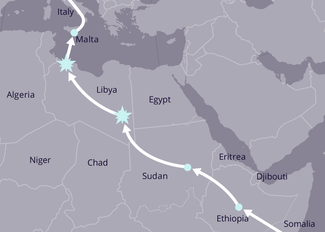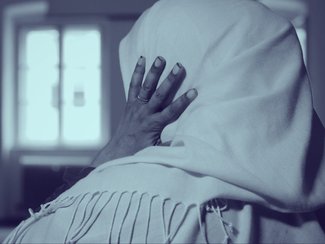Amina’s story
“I feel sorry for those taking the journey, I know the difficulties they are going through,” says Amina, recollecting the atrocities she encountered during her journey to Europe. “They will probably face what I have experienced, and even worse.”
Amina used to live in a village in Somalia where she ran a small vendor business. Her husband taught English at the local school. Like many villages in the area, hers was overrun by Al Shabaab who prohibited schools from teaching English, and women from running businesses. These new rules rendered Amina’s husband jobless but, despite being arrested twice, she continued running her business since it was her family’s only source of income.
Push came to shove when Al Shabaab sentenced her to death for defying their rules. That’s when she decided to run away, and embark upon a journey which she had limited knowledge about.
“I wanted to reach a peaceful country, that’s why I left Somalia,” she says. “I wasn’t aware I would face difficulties.”
Amina left her home under the cover of darkness. She brought along her two year old son, leaving the rest of her family behind. She didn’t know when she would see her husband or other children again.
With limited resources, and through the assistance of smugglers, she reached Addis Ababa. Before continuing on to Libya, Amina decided to leave her child with a Somali woman, sensing the journey would not be bearable for the child.
Once in Libya, Amina and about 50 other people were driven to an unknown location in the desert. There, they were held captive and subjected to torture which resulted in the death of two people, who died from the injuries they sustained during brutal beatings.
“We were sleeping on sand, there were no mattresses… there was nothing,” Amina recounts. “At night it’s cold and during the days it’s hot. We used the sand to cover our legs and arms from the cold. At night we slept as if we were buried,” she adds.
Listen as Amina recounts her escape from Somalia and 24 days spent in captivity

Following her release, Amina and the others were handed over to another group of traffickers. They were driven to the coastal city of Tripoli where they were to embark on the journey at sea. Upon arrival, they were once more held captive. Amina only succeeded in breaking free when she was assigned to take two women to the hospital who had broken their legs in a failed escape attempt.
Thereafter, Amina attempted to continue her journey by sea. Her first two tries were unsuccessful; the boats were captured and returned to Libya, where she was subjected to months in jail and forced labor. Only after her third attempt did she succeed.
“If the choice is between returning to Libya or dying at sea, dying at sea would be the preferable option— that rather than going back to a Libyan jail,” she says.
Listen to Amina recount her two years spent in Libya.
After the rescue at sea, Amina was taken to a reception center from where she escaped. Through the assistance of Somalis, she boarded a bus from Italy to Austria where she was taken to a refugee camp in Vienna and applied for asylum.
Amina hopes that one day she will be reunified with her children and intends to begin the reunification process within two years.

